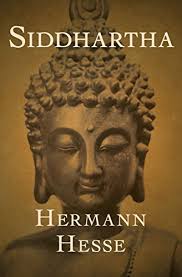Siddhartha Page #7
Siddhartha is a novel by Hermann Hesse that deals with the spiritual journey of self-discovery of a man named Siddhartha during the time of the Gautama Buddha. The book, Hesse's ninth novel, was written in German, in a simple, lyrical style.
Siddhartha placed his hand on Govinda's shoulder: "You failed to hear my good wish for you, oh Govinda. I'm repeating it: I wish that you would go this path up to its end, that you shall find salvation!" In this moment, Govinda realized that his friend had left him, and he started to weep. "Siddhartha!" he exclaimed lamentingly. Siddhartha kindly spoke to him: "Don't forget, Govinda, that you are now one of the Samanas of the Buddha! You have renounced your home and your parents, renounced your birth and possessions, renounced your free will, renounced all friendship. This is what the teachings require, this is what the exalted one wants. This is what you wanted for yourself. Tomorrow, oh Govinda, I'll leave you." For a long time, the friends continued walking in the grove; for a long time, they lay there and found no sleep. And over and over again, Govinda urged his friend, he should tell him why he would not want to seek refuge in Gotama's teachings, what fault he would find in these teachings. But Siddhartha turned him away every time and said: "Be content, Govinda! Very good are the teachings of the exalted one, how could I find a fault in them?" Very early in the morning, a follower of Buddha, one of his oldest monks, went through the garden and called all those to him who had as novices taken their refuge in the teachings, to dress them up in the yellow robe and to instruct them in the first teachings and duties of their position. Then Govinda broke loose, embraced once again his childhood friend and left with the novices. But Siddhartha walked through the grove, lost in thought. Then he happened to meet Gotama, the exalted one, and when he greeted him with respect and the Buddha's glance was so full of kindness and calm, the young man summoned his courage and asked the venerable one for the permission to talk to him. Silently the exalted one nodded his approval. Quoth Siddhartha: "Yesterday, oh exalted one, I had been privileged to hear your wondrous teachings. Together with my friend, I had come from afar, to hear your teachings. And now my friend is going to stay with your people, he has taken his refuge with you. But I will again start on my pilgrimage." "As you please," the venerable one spoke politely. "Too bold is my speech," Siddhartha continued, "but I do not want to leave the exalted one without having honestly told him my thoughts. Does it please the venerable one to listen to me for one moment longer?" Silently, the Buddha nodded his approval. Quoth Siddhartha: "One thing, oh most venerable one, I have admired in your teachings most of all. Everything in your teachings is perfectly clear, is proven; you are presenting the world as a perfect chain, a chain which is never and nowhere broken, an eternal chain the links of which are causes and effects. Never before, this has been seen so clearly; never before, this has been presented so irrefutably; truly, the heart of every Brahman has to beat stronger with love, once he has seen the world through your teachings perfectly connected, without gaps, clear as a crystal, not depending on chance, not depending on gods. Whether it may be good or bad, whether living according to it would be suffering or joy, I do not wish to discuss, possibly this is not essential--but the uniformity of the world, that everything which happens is connected, that the great and the small things are all encompassed by the same forces of time, by the same law of causes, of coming into being and of dying, this is what shines brightly out of your exalted teachings, oh perfected one. But according to your very own teachings, this unity and necessary sequence of all things is nevertheless broken in one place, through a small gap, this world of unity is invaded by something alien, something new, something which had not been there before, and which cannot be demonstrated and cannot be proven: these are your teachings of overcoming the world, of salvation. But with this small gap, with this small breach, the entire eternal and uniform law of the world is breaking apart again and becomes void. Please forgive me for expressing this objection." Quietly, Gotama had listened to him, unmoved. Now he spoke, the perfected one, with his kind, with his polite and clear voice: "You've heard the teachings, oh son of a Brahman, and good for you that you've thought about it thus deeply. You've found a gap in it, an error. You should think about this further. But be warned, oh seeker of knowledge, of the thicket of opinions and of arguing about words. There is nothing to opinions, they may be beautiful or ugly, smart or foolish, everyone can support them or discard them. But the teachings, you've heard from me, are no opinion, and their goal is not to explain the world to those who seek knowledge. They have a different goal; their goal is salvation from suffering. This is what Gotama teaches, nothing else." "I wish that you, oh exalted one, would not be angry with me," said the young man. "I have not spoken to you like this to argue with you, to argue about words. You are truly right, there is little to opinions. But let me say this one more thing: I have not doubted in you for a single moment. I have not doubted for a single moment that you are Buddha, that you have reached the goal, the highest goal towards which so many thousands of Brahmans and sons of Brahmans are on their way. You have found salvation from death. It has come to you in the course of your own search, on your own path, through thoughts, through meditation, through realizations, through enlightenment. It has not come to you by means of teachings! And--thus is my thought, oh exalted one,--nobody will obtain salvation by means of teachings! You will not be able to convey and say to anybody, oh venerable one, in words and through teachings what has happened to you in the hour of enlightenment! The teachings of the enlightened Buddha contain much, it teaches many to live righteously, to avoid evil. But there is one thing which these so clear, these so venerable teachings do not contain: they do not contain the mystery of what the exalted one has experienced for himself, he alone among hundreds of thousands. This is what I have thought and realized, when I have heard the teachings. This is why I am continuing my travels--not to seek other, better teachings, for I know there are none, but to depart from all teachings and all teachers and to reach my goal by myself or to die. But often, I'll think of this day, oh exalted one, and of this hour, when my eyes beheld a holy man." The Buddha's eyes quietly looked to the ground; quietly, in perfect equanimity his inscrutable face was smiling. "I wish," the venerable one spoke slowly, "that your thoughts shall not be in error, that you shall reach the goal! But tell me: Have you seen the multitude of my Samanas, my many brothers, who have taken refuge in the teachings? And do you believe, oh stranger, oh Samana, do you believe that it would be better for them all the abandon the teachings and to return into the life the world and of desires?"
Translation
Translate and read this book in other languages:
Select another language:
- - Select -
- 简体中文 (Chinese - Simplified)
- 繁體中文 (Chinese - Traditional)
- Español (Spanish)
- Esperanto (Esperanto)
- 日本語 (Japanese)
- Português (Portuguese)
- Deutsch (German)
- العربية (Arabic)
- Français (French)
- Русский (Russian)
- ಕನ್ನಡ (Kannada)
- 한국어 (Korean)
- עברית (Hebrew)
- Gaeilge (Irish)
- Українська (Ukrainian)
- اردو (Urdu)
- Magyar (Hungarian)
- मानक हिन्दी (Hindi)
- Indonesia (Indonesian)
- Italiano (Italian)
- தமிழ் (Tamil)
- Türkçe (Turkish)
- తెలుగు (Telugu)
- ภาษาไทย (Thai)
- Tiếng Việt (Vietnamese)
- Čeština (Czech)
- Polski (Polish)
- Bahasa Indonesia (Indonesian)
- Românește (Romanian)
- Nederlands (Dutch)
- Ελληνικά (Greek)
- Latinum (Latin)
- Svenska (Swedish)
- Dansk (Danish)
- Suomi (Finnish)
- فارسی (Persian)
- ייִדיש (Yiddish)
- հայերեն (Armenian)
- Norsk (Norwegian)
- English (English)
Citation
Use the citation below to add this book to your bibliography:
Style:MLAChicagoAPA
"Siddhartha Books." Literature.com. STANDS4 LLC, 2024. Web. 22 Dec. 2024. <https://www.literature.com/book/siddhartha_24>.




Discuss this Siddhartha book with the community:
Report Comment
We're doing our best to make sure our content is useful, accurate and safe.
If by any chance you spot an inappropriate comment while navigating through our website please use this form to let us know, and we'll take care of it shortly.
Attachment
You need to be logged in to favorite.
Log In